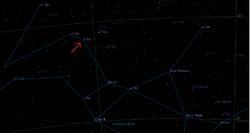いて座オミクロン星
| いて座ο星 ο Sagittarii | ||
|---|---|---|
| 星座 | いて座 | |
| 見かけの等級 (mv) | 3.77[1] | |
| 位置 元期:J2000.0 | ||
| 赤経 (RA, α) | 19h 04m 40.9820400284s[2] | |
| 赤緯 (Dec, δ) | −21° 44′ 29.385451232″[2] | |
| 視線速度 (Rv) | 26.1 ± 0.6 km/s[2] | |
| 固有運動 (μ) | 赤経: 77.445 ± 0.187 ミリ秒/年[2] 赤緯: -58.460 ± 0.142 ミリ秒/年[2] | |
| 年周視差 (π) | 23.8121 ± 0.1518ミリ秒[2] (誤差0.6%) | |
| 距離 | 137 ± 0.9 光年[注 1] (42 ± 0.3 パーセク[注 1]) | |
| 絶対等級 (MV) | 0.625[3] | |

| ||
いて座ο星の位置(矢印)
| ||
| 物理的性質 | ||
| 半径 | 11.7 ± 0.9 R☉[4] | |
| 質量 | 2.0 ± 0.3 M☉[4] | |
| 表面重力 (log g) | 2.66 cgs[3] | |
| スペクトル分類 | G9 IIIb[1] | |
| 光度 | 67.6 L☉[5] | |
| 有効温度 (Teff) | 4,759 K[3] | |
| 色指数 (B-V) | 1.01[1] | |
| 色指数 (U-B) | 0.85[1] | |
| 色指数 (R-I) | 0.53[1] | |
| 金属量[Fe/H] | -0.04[3] | |
| 年齢 | 2.39×109 年[5] | |
| 他のカタログでの名称 | ||
| いて座39番星, ADS 11996, BD-21 5237, GJ 9641, HD 177241, HIP 93683, HR 7217, IRC -20536, SAO 187643[2] | ||
| ■Template (■ノート ■解説) ■Project | ||
いて座ο星(いてざオミクロンせい、ο Sagittarii、ο Sgr)は、いて座にある恒星である[6]。見かけの等級は3.77と、肉眼でみえる明るさである[1]。年周視差に基づいて太陽からの距離を計算すると、約137光年である[2][注 1]。
位置・名称
[編集]いて座ο星は、南斗六星の北5度くらいの辺り、黄道のすぐ北に位置している[6]。いて座の主要部分を占める「ティーポット」と呼ばれるアステリズムと並ぶ、「ティースプーン」というアステリズムを、いて座π星、いて座ξ星、いて座d星、いて座ρ1星と共に形成している[7][6][注 2]。
中国ではいて座ο星は、太陽・月・惑星が出入りする関所、あるいは旗を表す建(拼音: )という星官を、いて座ξ2星、いて座π星、いて座d星、いて座ρ1星、いて座υ星と共に形成する[9][10]。いて座ο星自身は、建二(拼音: )すなわち建の2番星に当たる[9][10]。
特徴
[編集]いて座ο星は黄色巨星で、スペクトル型はG9 IIIbに分類される[1]。いて座ο星は、巨星の中でもレッドクランプ巨星と位置づけられ、年齢はある程度以上古く、金属欠乏でもないことが示唆される[11]。いて座ο星の年齢は24億年と推定され、金属量は太陽との比較で9割程度とみられる[5][3]。質量は太陽の2倍程度、半径は太陽の12倍程度まで広がり、光度は太陽のおよそ68倍、光球の有効温度は4759 Kと見積もられている[4][5][3]。
いて座ο星は、トーマス・シーによって「伴星」が発見され、二重星とみなされている[12][13]。この「伴星」は、いて座ο星から南西に30ないし40秒離れた位置にあるが、天の川の中に位置するいて座ο星は周囲に無数の背景星があり、この「伴星」だけが物理的に関係があるとは考えづらく、いて座ο星は単独星の可能性が高いとされている[13][6][14]。
脚注
[編集]注釈
[編集]出典
[編集]- ^ a b c d e f g Hoffleit, D.; Warren, W. H., Jr. (1995-11), “Bright Star Catalogue, 5th Revised Ed.”, VizieR On-line Data Catalog: V/50, Bibcode: 1995yCat.5050....0H
- ^ a b c d e f g h “omi Sgr -- High Proper Motion Star”. SIMBAD. CDS. 2024年3月1日閲覧。
- ^ a b c d e f Liu, Y. J.; et al. (2007-12), “The abundances of nearby red clump giants”, Monthly Notices of the Royal Astronomical Society 382 (2): 553-566, Bibcode: 2007MNRAS.382..553L, doi:10.1111/j.1365-2966.2007.11852.x
- ^ a b c Cruzalèbes, P.; et al. (2013-09), “Fundamental parameters of 16 late-type stars derived from their angular diameter measured with VLTI/AMBER”, Monthly Notices of the Royal Astronomical Society 434 (1): 437-450, Bibcode: 2013MNRAS.434..437C, doi:10.1093/mnras/stt1037
- ^ a b c d Luck, R. Earle (2015-09), “Abundances in the Local Region. I. G and K Giants”, Astronomical Journal 150 (3): 88, Bibcode: 2015AJ....150...88L, doi:10.1088/0004-6256/150/3/88
- ^ a b c d Kaler, James B. (2017年9月1日). “OMI SGR (Omicron Sagittarii)”. Stars. University of Illinois. 2024年3月1日閲覧。
- ^ Lawrence, Pete (2022年6月28日). “A guide to the Teapot asterism”. BBC Sky at Night Magazine. Our Media Ltd.. 2024年3月1日閲覧。
- ^ Kunitzsch, Paul; Smart, Tim (2006). A Dictionary of Modern Star Names. Cambridge, MA: Sky & Telescope. pp. 51-52. ISBN 978-1-931559-44-7
- ^ a b “中國古代的星象系統 (63): 斗宿天區” (中国語). AEEA 天文教育資訊網. 國立自然科學博物館 (2006年7月2日). 2024年2月1日閲覧。
- ^ a b Wylie, Alexander (1897). “Part III.—Scientific”. Chinese researches. Shanghai. p. 134
- ^ Alves, David R. (2000-08), “K-Band Calibration of the Red Clump Luminosity”, Astrophysical Journal 539 (2): 732-741, Bibcode: 2000ApJ...539..732A, doi:10.1086/309278
- ^ See, T. J. J. (1898-03-28), “Discoveries and measures of double and multiple stars in the southern hemisphere”, Astronomical Journal 18: 181-187, Bibcode: 1898AJ.....18..181S, doi:10.1086/102881
- ^ a b Mason, Brian D.; et al. (2024-01), “The Washington Visual Double Star Catalog”, VizieR On-line Data Catalog: B/wds, Bibcode: 2024yCat....102026M
- ^ Eggleton, P. P.; Tokovinin, A. A. (2008-09), “A catalogue of multiplicity among bright stellar systems”, Monthly Notices of the Royal Astronomical Society 389 (2): 869-879, Bibcode: 2008MNRAS.389..869E, doi:10.1111/j.1365-2966.2008.13596.x
関連項目
[編集]外部リンク
[編集]- “ARICNS 4C02788”. ARI Data Base for Nearby Stars. Astronomisches Rechen-Institut Heidelberg (1988年3月4日). 2024年3月1日閲覧。
- “ο Sagittarii”. alcyone software. 2024年3月1日閲覧。
